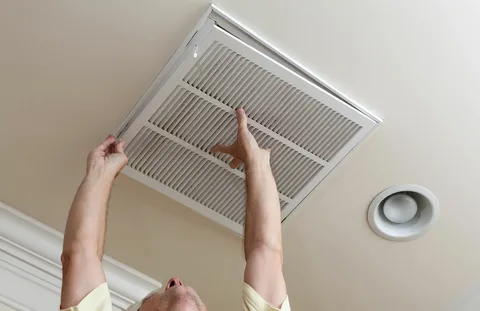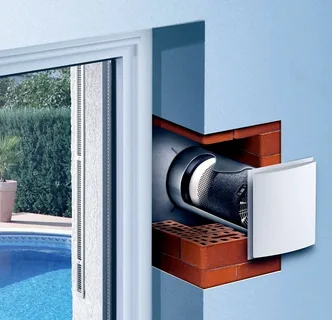In today’s world, air pollution has become a serious problem that affects our health and well-being. It’s crucial to breathe in clean and fresh air, especially in our homes, where we spend most of our time. A home ventilator is an essential appliance that can help purify the air and maintain a comfortable living environment. These are the significant benefits of investing in a home-ventilator that will make a positive impact on your life. So, let’s explore why having a home-ventilator is a wise investment for your family’s health and comfort.
Improve Indoor Air Quality
We often assume that the air we breathe indoors is clean and healthy, but unfortunately, that is not always the case. The air in our homes can be filled with pollutants, allergens, and other irritants that can affect our health and well-being. This is where a ventilator can come in handy.
By investing in a ventilator, you can significantly improve the indoor air quality of your home. A ventilator is designed to circulate the air in your home, which means it can filter out any pollutants, allergens, and irritants in the air, and replace it with clean and fresh air.
This can be particularly beneficial for those who suffer from allergies or respiratory problems, as it can significantly reduce the number of irritants in the air, allowing them to breathe easier. Not only that but by improving the indoor air quality, you can also reduce the risk of illness and improve overall health and well-being for you and your family.
 Reduce Allergens And Irritants
Reduce Allergens And Irritants
For those with allergies, respiratory issues, or even just a general aversion to dust and pollutants, a ventilator can be a game-changer. By constantly circulating fresh air throughout your home, a ventilator can help to reduce the presence of allergens and irritants that can cause discomfort or even illness.
These allergens and irritants can come from a variety of sources, from outdoor pollutants to pet dander, pollen, and mold spores. A ventilator works to filter out these pollutants and keep your home’s air clean and fresh. This can be especially beneficial for those who suffer from asthma or other respiratory conditions, as well as children and elderly individuals who may be more susceptible to respiratory issues.
Reducing allergens and irritants in the home can improve overall comfort and reduce symptoms like sneezing, coughing, and itchy eyes. It can also help to prevent the spread of germs and viruses, particularly during cold and flu season.
Prevent Stale Air And Odors
We’ve all experienced the unpleasant smell of stale air in our homes, especially during winter months when windows and doors are closed tightly. Not only can stale air be unpleasant, but it can also be a sign of poor indoor air quality. A ventilator can help prevent stale air by continuously exchanging stale air with fresh, filtered air from outside.
Stale air can also lead to the accumulation of unpleasant odors, such as those from cooking, pets, or smoking. These odors can be difficult to eliminate without proper ventilation. A ventilator can help remove these odors by continuously bringing in fresh air and expelling stale air.
Not only does a ventilator prevent stale air and odors, but it also helps maintain a healthy indoor environment. Without proper ventilation, indoor air can become stagnant, leading to the accumulation of harmful pollutants and allergens. By continuously exchanging indoor air with fresh, filtered air from outside, a ventilator can help improve indoor air quality and reduce the risk of respiratory illnesses.
Home Ventilator Control Humidity Levels
Controlling the humidity levels in your home is an essential part of maintaining a healthy and comfortable living environment. High levels of humidity can lead to mold growth, which can be harmful to your health. On the other hand, low humidity levels can cause dry skin and respiratory issues. A home ventilator can help regulate the humidity levels in your home, ensuring that they remain at an optimal level for your health and comfort.
Humidity is the amount of moisture present in the air. In general, the ideal humidity level for a home is between 30% to 50%. A ventilator can help achieve and maintain this optimal range. The device can regulate the flow of fresh air, which helps reduce the humidity level in the home. This fresh air helps dilute the moisture in the air, leading to a reduction in humidity levels.
A ventilator can also help control the humidity level in specific areas of your home, such as the basement or the attic. These areas are prone to high humidity levels, which can lead to mold growth. A ventilator can help remove the excess moisture from these areas, keeping them dry and mold-free.
Improve Respiratory Health
Did you know that poor indoor air quality can significantly impact your respiratory health? It’s true! When you’re breathing in air that’s full of pollutants and other irritants, it can irritate your throat and lungs. This can lead to chronic respiratory issues like asthma and allergies. Thankfully, investing in a ventilator can help improve your respiratory health in many ways.
One of the primary benefits of a ventilator is that it circulates fresh air throughout your home. This means that you’re constantly breathing in clean air that’s free of pollutants and allergens.
A ventilator can help reduce humidity levels in your home. This is especially important if you live in an area with high humidity levels, as excess moisture can lead to the growth of mold and mildew. These fungi can cause respiratory issues like allergies and asthma.
Enhance Overall Comfort
The benefits of a ventilator extend beyond simply improving the air quality. It can also enhance the overall comfort level of your home. With proper ventilation, the temperature and humidity levels in your home can be regulated to create a comfortable and healthy living environment.
A well-ventilated home feels more comfortable than one with stale air and poor circulation. You will notice that your home will be cooler in the summer and warmer in the winter. This can help you reduce your reliance on air conditioning and heating, ultimately saving you money on your energy bills.
Save On Energy Costs
One of the major benefits of investing in a ventilator is that it can help save on energy costs. Ventilators are designed to work in conjunction with your existing HVAC system, which means they can help improve the efficiency of your heating and cooling system.
When your home has poor ventilation, your HVAC system has to work harder to maintain a comfortable indoor temperature. By improving ventilation, you can reduce the amount of work your HVAC system has to do, which can lead to significant energy savings.
A ventilator can help to regulate temperature and humidity levels, ensuring that your HVAC system isn’t working harder than it needs to. This can lead to even more savings on your energy bills, as you won’t need to use as much energy to maintain a comfortable indoor environment.
Easy Maintenance
One of the greatest benefits of investing in a ventilator is how easy it is to maintain. Unlike other home appliances that require frequent servicing and cleaning, ventilators are designed to be low maintenance.
Most ventilators have washable filters that only need to be cleaned or replaced once or twice a year. Some models even come with smart features that alert you when it’s time to clean or replace the filters.
The ventilator unit itself doesn’t require any special cleaning or maintenance beyond regular dusting or wiping down with a damp cloth. This means you can enjoy the benefits of clean and fresh air without any additional hassle or effort.
Reduce Carbon Footprint
Not only do ventilators improve the air quality and overall comfort of your living space, but they also have a positive impact on the environment. By investing in a ventilator, you can reduce your carbon footprint in several ways.
Firstly, a ventilator can help to regulate indoor air temperature and humidity levels, reducing the need for energy-hungry air conditioning and dehumidifying units. This means you can enjoy a more comfortable living space while using less energy and ultimately reducing your energy bills.
In addition to reducing your energy consumption, a ventilator can also reduce your reliance on artificial fragrances and air fresheners, which can be damaging to the environment. With a ventilator, you can enjoy the benefits of fresh, clean air without the need for harmful chemicals.
Versatile Options For Different Needs
Ventilators come in a variety of options to suit different needs and requirements. Depending on your living space and lifestyle, you can choose from various models, sizes, and features to enjoy the best benefits of fresh air ventilation.
For small apartments or bedrooms, portable or compact models are an excellent choice. They can be easily moved from room to room and are perfect for those who want to breathe in fresh air while sleeping.
If you live in a larger house or have a larger family, a whole-house ventilator might be a better fit. These systems can work with your existing HVAC system to provide fresh air to every room in your home, ensuring that your indoor air quality remains healthy and consistent throughout the day.
Different types of ventilators use various technologies to provide the best air quality. For example, some models use heat or energy recovery systems to conserve energy and reduce the need for outdoor air conditioning.
| Other Good Articles to Read |
| Blogs Rain |
| Cme Blog Spot |
| Garcias Blogs |
| Yyc Blogs |
| Guiade Blogs |
| Blogs-Hunt |
| Impact-Blog |
| Smarty Blogs |
| Ed Blog |
| Mo Blogs |
| Blogs Em |
| Blogs T |



